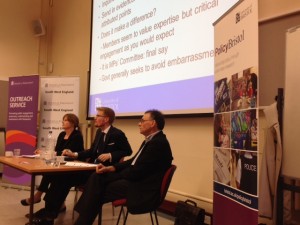
Stephen Halsey, PolicyBristol Intern and Assistant Teacher, School of Economics, Finance and Management
How can research influence government and the policy making process? What are the best ways to engage with Parliament? As part of PolicyBristol’s training programme, a couple of weeks ago we hosted an event to address these vital questions. We welcomed speakers from the Houses of Parliament Outreach Service, the Parliamentary Office of Science and Technology (POST) and the Education Select Committee as well as one of our own academics with a depth of experience in engaging with parliamentary processes. Speakers were:
- Liz Price, Regional Officer – Wales and SW England, Parliament’s Outreach ServiceSarah Bunn, Scientific Adviser, Biology and Health, POST
- Sarah Bunn, Scientific Adviser, Biology and Health, POST
- Martin Smith, Committee Specialist, Commons Education Select Committee
- David Berridge, Professor of Child & Family Welfare, School for Policy Studies
Liz Price introduced the Parliamentary Outreach Service highlighting the role it plays as an educator of parliamentary engagement. She outlined the different ways in which an individual can engage with the political process, including posing questions to your local MP (who should be your first port of call) for them to put forward in the Commons and suggesting debate topics through backbenchers, all of which raises the profile of a topic. She talked about the role of Committees, of which there are as many as there are topics/countries (see the list of All-Party Parliamentary Groups to get you started!). (You can learn more about the passage of a bill from this guide on the Parliament website.)
Dr. Sarah Bunn, Scientific Adviser for Biology and Health at POST, a Parliament-funded organisation whose role is to help MPs understand science/technology-related research and interpret complex information and which has a relatively new social science section, talked about what government officials look for in the evidence they receive. Briefs must be short and the following four factors must be paramount: relevance; impact; evidence and objectivity. She spoke about POST’s mission to improve academic knowledge within government through PhD fellowships, events which bring together scientists, MPs and Peers, and making papers available online (including POST notes, which aim to inform rather than make recommendations). POST’s relationship with the academic community is highly interactive, in order that the former’s papers are as well-informed as possible.
 Martin Smith, an Education Committee Specialist and the University of Bristol’s own David Berridge focused on select committee engagement. Martin described select committees as a cross-party mechanism for parliamentary scrutiny of government, which conduct inquiries, compile reports and make recommendations, and to which government is compelled to respond within 60 days. Many committee recommendations are taken up by government, making engaging with this mechanism an interesting option for academics. Options include submitting written evidence (which can be done online or sent directly to government offices), being invited to provide oral evidence, or at times being invited to an informal private seminar. Again, being concise, focusing on your unique angle and being clear about concrete recommendations are key at this stage of engagement. David then shared his own experience as a specialist adviser on children’s services to the Education Select Committee and explained how academic witnesses at inquiries are very common, with critical engagement being key. He emphasised the importance of taking evidence to MPs, rather than expecting them to come to you and closed the discussion by stressing the importance of public engagement and the desire from government officials for strong academic evidence.
Martin Smith, an Education Committee Specialist and the University of Bristol’s own David Berridge focused on select committee engagement. Martin described select committees as a cross-party mechanism for parliamentary scrutiny of government, which conduct inquiries, compile reports and make recommendations, and to which government is compelled to respond within 60 days. Many committee recommendations are taken up by government, making engaging with this mechanism an interesting option for academics. Options include submitting written evidence (which can be done online or sent directly to government offices), being invited to provide oral evidence, or at times being invited to an informal private seminar. Again, being concise, focusing on your unique angle and being clear about concrete recommendations are key at this stage of engagement. David then shared his own experience as a specialist adviser on children’s services to the Education Select Committee and explained how academic witnesses at inquiries are very common, with critical engagement being key. He emphasised the importance of taking evidence to MPs, rather than expecting them to come to you and closed the discussion by stressing the importance of public engagement and the desire from government officials for strong academic evidence.
This was an extremely informative and interesting event with a great range of academics in attendance from across the university’s Faculty of Social Sciences and beyond. We look forward to working with our parliamentary partners to deliver further events and trainings in the future, which may include topics such as: ‘how to write a briefing which an MP will read’ and ‘the ins and outs of the passage of legislation’. We also look forward to collaborating with the Houses of Parliament Outreach Service later in the year in an exercise to bring together researchers and parliamentary staff to examine opportunities for researchers to work with Parliament. Keep an eye on our website for further information as plans take shape.
Keep an eye on our regularly updated policy scan which will keep you posted on what to look out for in Westminster over the coming weeks and months. You may be interested to follow @UKParlOutreach @POST_UK @CommonsEd and of course @PolicyBristol
